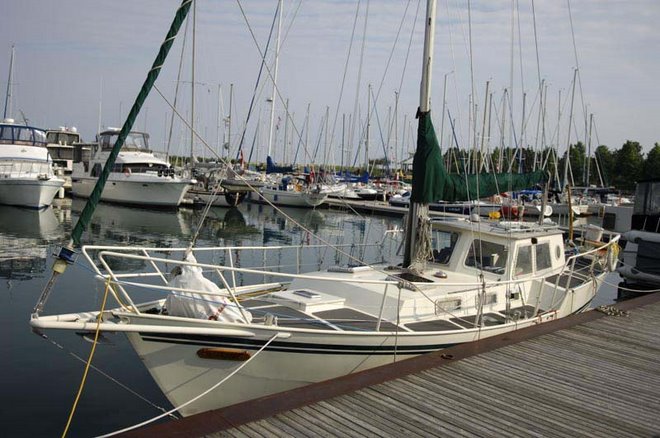
I was down at my boat a couple of weeks ago in one of the fleeting moments of neither winter nor spring that has left the local climate and boat maintenance jobs in a bit of a holding pattern. I was there to measure the boltholes in my old and troublesome Harken traveller. There's nothing wrong with it, really, aside from an awkward, peg-style design (see photo), which I dislike and is why it's getting replaced by the estimable people at Garhauer with a continuous block and tackle, "variable" traveller set-up. I may recycle the track as a pole lift for the front of the mast, which is currently so free of penetrations as to be considered virginal.
Garhauer is a relatively small company that makes very good and comparatively cheap blocks and tracks and other deck gear using the oddest business model I have yet to see. And if standing on a cradled boat with a tape measure in a late winter Toronto half-gale isn't romantic, I don't know what is.
Anyway, I had ordered a new traveller in January at the boat show from an elderly, mumbling gent with no signage over his meager booth aside from a tiny piece of card with the word "Garhauer" on it. This was loosely lashed over a church basement type of folding table covered in shiny blocks and beckets and complicated, spinny things that make sailors go "ooh". And the prices are half that of the "big names". So this old fella is Bill, the president of the company, and he takes my order on a carbon copy form of the type I last saw in the '70s. I suspect there was a wee tray into which the scrawled orders were stowed until the exodus for California was over.
Six weeks later, I get a call from Guido, the man who will actually fabricate the traveller. He says, in an accent that is more Milan than New Jersey: "You have four-inch centers on a six-foot track listed...but how far in should the first bolt hole be?" "I dunno...good question", I reply, hence the bicycle trip some miles away to the dank and muddy marina.
I phone back to California and ask for Guido, who is busy polishing something large. Eventually, I give him the required information. He *then* says: "So, do you want quarter-inch bolt holes or 5/16ths?"
Jesus feck, I'm not going back again until Monday. "Make it 5/16ths", I say, "Bigger is better and as I can drill a bigger hole if needed, I can't go wrong with 5/16ths. We are intending to go offshore..." Guido seems on his game. It's certainly the personal touch, all this carbon paper and Guido-quizzing. And I suppose it's why I keep buying their gear. Hence the provisional endorsement (I haven't seen the traveller yet!): www.garhauer.com





